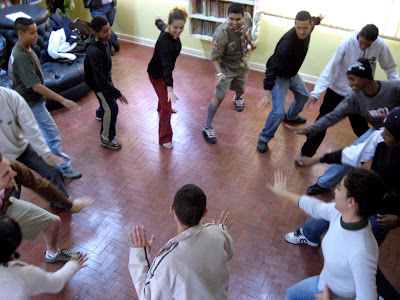
I depart from Brazil with my mind absolutely reeling. In total, we covered over 500 miles by taxi and bus in just four days! I visited more than 30 projects. Interviewed 23 people. Spoke about the movement to nearly 300.
I got bumped to business class and spent the whole flight playing with the fold-flat bed.

Then I got sent back to reality on my way to Paris, making full use of my 18 inches of personal space (does anyone else wonder why employees of the World Bank, a development bank, fly business class? Shouldn’t that $6000 be used for, oh I don’t know, development?)

I slept in a hotel and was seen naked by the maid (I forgot to hang the “Do Not Disturb” placard). I moved to a coworker’s house and shared a room with a one-year-old named Lucas who just recently started enjoying solid foods. I spent countless hours dozing in taxis on the ride to project sites and spent many less hours dozing in a bed at night.

I learned that time moves at its own pace here. Dinner at 8? That means 10. Samba at 11? That means 12:30. Meet at 10? 11:15 sounds great! At first it drove my type ‘A’ personality completely insane. Then I realized that I didn’t need to be on time either, which meant more time for naps. I embraced this concept.

I discovered – along with my host family – that it is indeed possible to fit six people and a baby in a Hyundai Tucson, and that “The Police” sound even better when accompanied by a very diverse group of back-up singers.

I got addicted to Nintendo Wii and built a bitter rivalry with an 8-year-old named Sofi and two 11-year-olds (Vicky & Mili) that led to a rather intense thumb war.

I realized that to build a movement you’ve got to connect with people on so many levels, from a dance-off in the city streets (where I busted out an incredible robot) to sharing iPod playlists and at least attempting to speak the local language.

I met young people who are changing the world, and I did my best to learn their stories to communicate them with the rest of the world.
I was changed.
Brazil, we had a bumpy affair, but you will be missed. Obragado!













